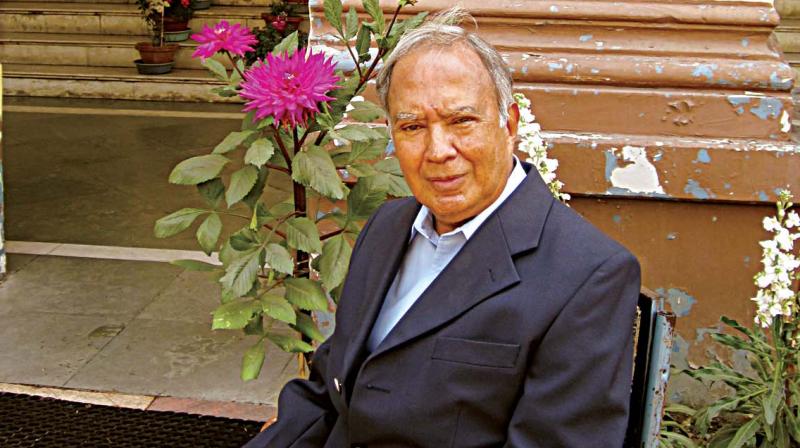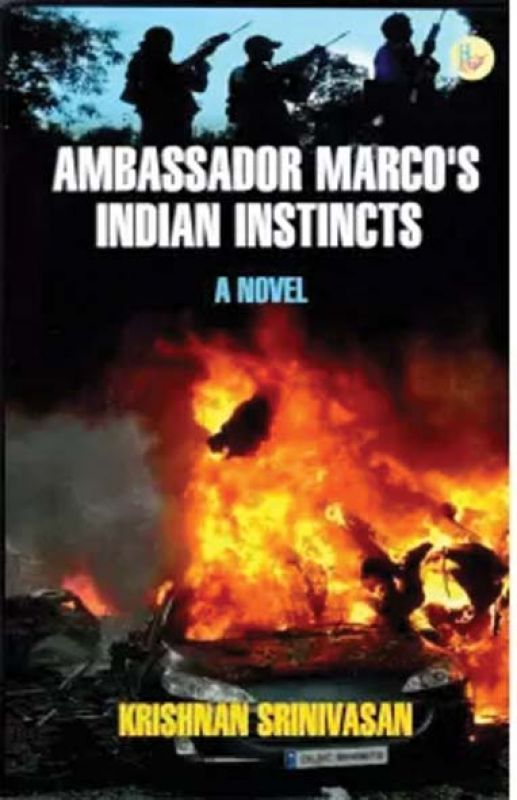The reluctant envoy's brush with terror

Ambassador Michael Marco is back. In another novel about his anti-hero, Krishnan Srinivasan provides the reader with everything modern thrillers offer: two countries (India and Pakistan) on the verge of war after numerous murders and bomb blasts on both sides of the border; the state of West Bengal in its endless fight against the Naxalites controlling vast areas in the countryside; and a part of the story playing out in Sweden, which thanks to best-seller authors like Henning Mankell or HåkanNesser, has become the very hotspot for psychopathic mass murderers. Finally, there is a love-story between a temperamental Bengali beauty and reserved Swede, which, together with the Swede’s attempt to explore Naxalite territory during his very first trip to India, appears somewhat far-fetched.
What on the surface would seem to be the usual struggle between good versus bad, India versus Pakistan or state versus terrorists,turns out to be indeed a very balanced story of many shades of grey. Without giving away too much for potential readers, of whom there should be many, it is not necessarily the jihadists, terrorists or the ISI of Pakistan being the bad guys. The real antagonism is that between a loud, big-mouthed, modern professional world where advertisingoneself makes careers, versus old-style diplomacy by a modest, unimpressive, Somalian, ade facto stateless diplomat who even does not hold an email account. Michael Marco is not hunting around the globe in supersonic planes or hacking high-security databases as the heroes do in so many other thrillers. He even does not own, let alone use, a mobile phone. This man is noticeable, if at all, for his crumpled jackets and shirts together with open shoelaces, but he commands qualities which are not regarded in high esteem any more, above alla sharp brain and his tremendous ability to listen to others.
In a manner of speaking, the author demonstrates an attitude similar to his protagonists. Whereas modern so-called scandal writers hope to attract the public by numerous explicit sex scenes and pseudo-modern slang, Krishnan Srinivasan is old-fashioned in the very best sense. There is no lack of excitement and unexpected turns, although the author has deliberately avoided any such cheap show effects. This a novel written by a former Indian diplomat who commands excellent knowledge of all places and protagonists, told in wonderful sophisticated English.
Therefore, in having written a most entertaining novel, Krishnan Srinivasan makes a point that goes far beyond the actual story. Real life, and even more, real politics,are not contained in the big headlines, video clips, messages on Twitter or postings on Facebook. What finally counts, is the professional and personal performance of human beings, often not visible to others. Certainly among the best parts of the novel are those, where the author, a former Foreign Secretary, introduces the reader to the world of international diplomacy and the Ministry of External Affairs in New Delhi. The portrayals could not be more realistic. There is the American ambassador keen to play the mediator between India and Pakistan, qualified by nothing but great ignorance of the background of the eternal conflict, and his own ambition to promote his career. Then there is the Indian prime minister, who both knows public diplomacy and all the devious tricks of the business including the dirty games played within the Diplomatic Corps. It is he who once again employs the foreign ex-diplomat Marco to help India settle a severe crisis, and it is he who keeps the secret hidden, when the Somali finally succeeds, even from members of his own cabinet.
As in Krishnan Srinivasan’s last novel, Michael Marco constantly dreams of returning to his homeland in Somalia, though he sees little chance there for physical survival, let alone his passport being renewed. One would hope that like in the earlier novels, Marco once again gets stuck on his way home in order to become the anti-hero of another wonderful novel of the same genre.
‘For a diplomat, patience is everything’
“In politics, a week is a long time. In diplomacy, patience is everything," said former diplomat Krishnan Srinivasan, as he talked about his fifth work of fiction, Ambassador Marco's Indian instincts. This sense of quiet forbearance is evident both in the author and his protagonist, the shabby, seemingly inconsequential Ambassador Marco.
His mild demeanour belies his insight. Marco's high-powered perception cuts through deceit and pretension, resulting in a thrilling narrative replete with sensitive bilateral ties, murder, violent Maoists and dealings with the Indian government, for whom he works. This is Marco's second appearance as protagonist (he made his debut in The Invisible African) and Srinivasan takes the opportunity to add more dimensions to this scruffy, albeit endearing character.
“I modelled him after a diplomat I met in Zambia many years ago,” said Srinivasan. “He hailed from a country that doesn't really have a voice in the global scenario but despite that, he had his finger on the social pulse. That sparked something in me, he was the kind of man I wanted my protagonist to be.” Ambassador Marco finds, as he arrives in India, that combating prejudice is as crucial as the job he was hired to do. “Prejudices cannot be avoided, we all have them. It's hard to put yourself in someone else's shoes,” he said.
In Ambassador Marco's Indian instincts, our hero, who is the executor of the will of his Indian friend Baldev Vaccher, accompanies the latter's daughter to Sweden, where his interest is piqued by a couple who have been found dead under very mysterious circumstances. “In India, Marco is enlisted by the Prime Minister to act as a mediator with Pakistan. He also stumbles upon a group of people with close ties to Maoists,” said Srinivasan.
The book raises several questions – the widespread, public hankering for immediate answers, our collective tendency to form strong opinions with very little information and the superficiality of contemporary life, all told in Srinivasan’s characteristic, very proper, British style. Srinivasan’s career, first as a diplomat and then as the Deputy General Secretary of the Commonwealth, lends itself, with great depth, to the character of Marco, the extensively detailed political fabric in which he finds himself and the many challenges of diplomacy. “There’s no such thing as a big country or a small one. If you’re a superpower, you can afford to have a voice, if you come from a mid-level power, you don’t. The one thing I learned about diplomacy, though, is that nobody can afford to be arrogant.”


